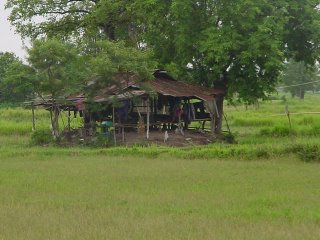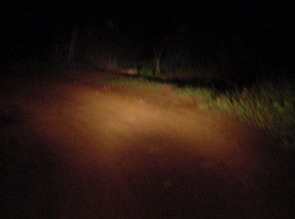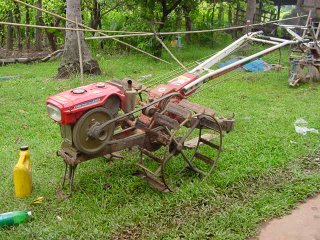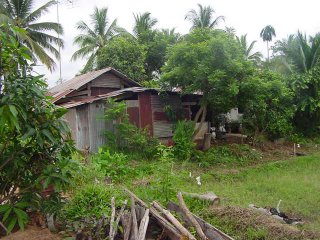
OK, which is the rice farmer’s house? Picture on the left, or below?
Good guess, but only half-right.
The house below is just a part-time living living space for farmers at rice planting and harvesting, a place of respite from the midday heat at lunch or break time. Sometimes, it's an overnight place to sleep if animals or "rice poachers" are threatening the harvest.
The one on the upper left? It doesn’t exist. It came out of someone’s imagination. (Not a bad seaside cottage, huh?)
 A
As we left our last touristy spot, a beautiful drive along a vast reservoir rimmed by a national park, I was enjoying my first day as a farmer quite well. However, I had second thoughts as night began to fall, and we turned off the pavement onto a narrow dirt track. An approaching heavy cloud cover added to the blackness, and soon produced lightning, thunder, and a tropical downpour. Vinny was very quiet, concentrating on the obstacle-course-like country road. The dirt track became a prolonged mud hole, and I began to wonder… 1) Are we going to make it out of the next muddy hole without a broken axle? and 2) Does this farming village even have electricity? I knew we had really hit the “boonies” when my cell phone lost its signal.
 The dark route
The dark route
to the village,
just before
the storm hit.With the blackness, lightning, thunder, blinding sheets of rain, cow-path muddy road to an unknown village back in the sticks and no communication to the outside world, it looked like a prelude to a B-rated horror flick.
I had no idea what kind of living conditions I would be facing at the end of that road. So, as usual, I had packed for all eventualities; bottled water, my tropical-weather sleeping cocoon (thin, cool silk; but keeps the critters off the skin), mosquito net, flashlight with extra batteries, and insect repellent. I even stashed a little bag of peanuts, since there might not be a refrigerator to raid at three a.m.
Consternation turned to relief as I could see the ELECTRIC lights of a little village up ahead through the heavy rain. Ah, Thailand has done a good job of electrifying at least 99% of its villages, and I was in the majority tonight! After driving through the center of a small town, we came to the edge, where the rice fields were, and pulled into a rice farmer’s compound.
Vinny’s mom and dad hadn’t seen him in many months and the Thai greeting was typical—no hugs, no surprised expressions nor raised voices in welcome--just a simple, silent hand motion to direct us into the drier house. I could tell mom-and-dad-rice-farmer had done well here. They had a hired hand, a“mechanical buffalo” out in the front yard, and a tile floor in their home. The house was closed-in on three sides, but open to nature along the fourth side.

Picture note: The "mechanical buffalo" complains a lot less, doesn't have to be
taken out to graze every day (time-consuming), and is a status symbol for a
farmer who's "made it." You still have to follow behind it, and take whatever mud it
kicks back into your face. Some things just don't change.
This kind of house construction is generally compatible with the Thai environment except for when the flying termites swarm annually and an occasional windstorm whips through the land.
Tonight was our “lucky” night of the year--the flying termites.
Literally thousands of airborne termites swarmed through the farmyard, and hundreds of their comrades were flying through the house as we entered.
As we swatted the air, a small meal of grilled rice-paddy fish, sticky rice, and rainwater was served as Vinny introduced the first white foreigner that mom and dad had ever welcomed into their home. His sister and brother-in-law joined us from their farm a little ways down the road. Interspersed with the airborne combat (and fishing the winged critters out of the food and drink) we had a good time getting acquainted. His parents, in their 70’s, were the umpteenth generation to farm this land which produced enough rice to sustain its owners for centuries. Mom was in good health, but dad was ailing. Despite his declining health, he continued to daily work the farm. Daughter and son-in-law helped them on their farm, along with the services of the hired hand.
Early evening turned to mid-evening and, true to farm life everywhere, it was early to bed. Much work to be done tomorrow. I was tired from the long day, and my eyes had been drooping for the past half hour anyway. Isan families (and guests) all sleep in the same open space, and I was looking forward to throwing my sleeping bag down among the family members on the floor (comfort and safety in numbers—typical Isan fashion). Brother-in-law and sister would stay the night, so along with the hired help, that would make seven of us finding our own little niche on the floor.
However, Vinny must have told his parents how much foreigners like their privacy. I assumed that, because while everyone bedded down on the tile floor, I was taken aside. Vinny fired up  the gas lantern and took me a few meters across the muddy yard to an older shanty, which had been the previous family home. It obviously hadn’t been used in years. As we swept aside the cobwebs, and found a place to hang the gas lantern, I surveyed the one-room hut: It stood about three feet above the ground on stilts. One-inch gaps in the floorboards and wallboards told me I’d be needing my mosquito net, without a doubt. Fortunately, the roof was still in good repair, and it was dry. Vinny left the lantern, and bid goodnight.
the gas lantern and took me a few meters across the muddy yard to an older shanty, which had been the previous family home. It obviously hadn’t been used in years. As we swept aside the cobwebs, and found a place to hang the gas lantern, I surveyed the one-room hut: It stood about three feet above the ground on stilts. One-inch gaps in the floorboards and wallboards told me I’d be needing my mosquito net, without a doubt. Fortunately, the roof was still in good repair, and it was dry. Vinny left the lantern, and bid goodnight.
OK, I’m on my own. Now, mind you, I’ve taken two-week solo backpack trips up into the Cascade Mountains of my home state—sleeping on the ground, communing with nature, enjoying the great outdoors--without an ounce of fright or unease. A bear-sighting would normally not frighten me, but only be seen as a photo opportunity.
But there’s something just a little different about a foreign country and tropical environment. I’m constantly coming across new weird (read: “toxic, poisonous”) plants, reptiles and insects. I finally got used to my modern duplex in the university village (despite a toad and centipede or two in the house); but in a farmer’s shanty, alone, still stretched my comfort zone just a bit. At least it'd be nice to be able to ask someone nearby: "What's THAT!?" Or, "should I touch it?" Or even more importantly, "Should it be touching ME?"
I first tried seeing the advantages: OK, at least it’s closed in on four sides (fewer flying termites), and I had my own private bath area in back. But, some big unknowns: As I lay my bag down under the mosquito netting, I heard something scurrying in the weeds just barely three feet under the gaping floorboards. Then there was that dark, seldom-used farmer’s bathhouse out back. What unknown experiences awaited me there? Plenty…







